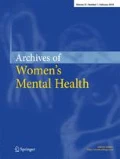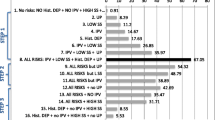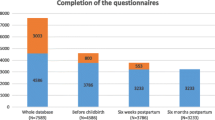Abstract
Evidence exists that the risk factors for depression in the antenatal and postnatal period may differ, but only a handful of studies looked at depression longitudinally. The aims of this study were (1) to estimate the prevalence of postnatal depressive symptoms in Kuwait where data about postnatal depression are scarce and identify its determinants and (2) to compare these risk factors between women who had experienced antenatal depressive symptoms and those that did not. Data collected in the TRansgenerational Assessment of Children’s Environmental Risk (TRACER) Study in Kuwait were used in this analysis. The sample was restricted to the 1348 women who answered the Edinburgh Postnatal Depression Scale (EPDS) both antenatally and postnatally. The prevalence of postnatal depressive symptoms, defined by an EPDS score ≥ 10, was 11.7%. Overall, antenatal depressive symptoms were the strongest determinant of postnatal depressive symptoms. Multivariable logistic regression analysis showed that in women with depressive symptoms in pregnancy, having a lower household income was the most significant risk factor for postnatal depressive symptoms. Among women without antenatal depressive symptoms, those who had lower income, were Kuwaitis, experienced other problems in pregnancy such as perceived stress, PTSD symptoms and social isolation, and those who delivered a boy had higher odds of postnatal depressive symptoms. Antenatal depressive symptoms and other psychosocial characteristics can predict postnatal depressive symptoms. Therefore, maternal mental health issues should be detected during the antenatal period and support should be provided in order to lower the risk of postnatal depression and its sequelae.

Similar content being viewed by others
References
Abdollahi F, Sazlina SG, Zain AM, Zarghami M, Asghari Jafarabadi M, Lye MS (2014) Postpartum depression and psycho-socio-demographic predictors. Asia-Pac Psychiatry 6:425–434. https://doi.org/10.1111/appy.12152
Adewuya AO, Fatoye FO, Ola BA et al (2005) Sociodemographic and obstetric risk factors for postpartum depressive symptoms in Nigerian women. J Psychiatr Pract 11:353–358. https://doi.org/10.1097/00131746-200509000-00009
Almazeedi H, Alsuwaidan MT (2014) Integrating Kuwait’s mental health system to end stigma: a call to action. J Ment Health 23:1–3. https://doi.org/10.3109/09638237.2013.775407
AlSeaidan M, Al Wotayan R, Christophi CA et al (2016) Birth outcomes in a prospective pregnancy-birth cohort study of environmental risk factors in Kuwait: the TRACER study. Paediatr Perinat Epidemiol 30:408–417. https://doi.org/10.1111/ppe.12296
Beck CT (2001) Predictors of postpartum depression: an update. Nurs Res 50:275–285
Bener A, Burgut FT, Ghuloum S, Sheikh J (2012) A study of postpartum depression in a fast developing country: prevalence and related factors. Int J Psychiatry Med 43:325–337. https://doi.org/10.2190/PM.43.4.c
Berle JØ, Mykletun A, Daltveit AK, Rasmussen S, Holsten F, Dahl AA (2005) Neonatal outcomes in offspring of women with anxiety and depression during pregnancy. A linkage study from the Nord-Trøndelag health study (HUNT) and medical birth registry of Norway. Arch Womens Ment Health 8:181–189. https://doi.org/10.1007/s00737-005-0090-z
Bindt C, Guo N, Te Bonle M et al (2013) No association between antenatal common mental disorders in low-obstetric risk women and adverse birth outcomes in their offspring: results from the CDS study in Ghana and Côte D’Ivoire. PLoS One 8:1–9. https://doi.org/10.1371/journal.pone.0080711
Brummelte S, Galea LAM (2016) Hormones and behavior postpartum depression : etiology , treatment and consequences for maternal care. Horm Behav 77:153–166. https://doi.org/10.1016/j.yhbeh.2015.08.008
Burgut FT, Bener A, Ghuloum S, Sheikh J (2013) A study of postpartum depression and maternal risk factors in Qatar. J Psychosom Obstet Gynaecol 34(2):90–97. https://doi.org/10.3109/0167482X.2013.786036
Chi X, Zhang P, Wu H, Wang J (2016) Screening for postpartum depression and associated factors among women in China: a cross-sectional study. Front Psychol 7:1–8. https://doi.org/10.3389/fpsyg.2016.01668
Chojenta CL, Lucke JC, Forder PM, Loxton DJ (2016) Maternal health factors as Risks for postnatal depression: a prospective longitudinal study. PLoS One 11:e0147246. https://doi.org/10.1371/journal.pone.0147246
Corrêa H, Castro T, Santos W et al (2016) Postpartum depression symptoms among Amazonian and northeast Brazilian women. J Affect Disord 204:214–218. https://doi.org/10.1016/j.jad.2016.06.026
Cox JL, Holden JM, Sagovsky R (1987) Detection of postnatal depression. Development of the 10-item Edinburgh postnatal depression scale. Br J Psychiatry 150:782–786
Da-Silva VA, Moraes-Santos A, Carvalho M et al (1998) Prenatal and postnatal depression among low income Brazilian women. Braz J Med Biol Res 31:799–804
Davey HL, Tough SC, Adair CE, Benzies KM (2011) Risk factors for sub-clinical and major postpartum depression among a community cohort of Canadian women. Matern Child Heal J 15:866–875. https://doi.org/10.1007/s10995-008-0314-8
De Tychey C, Briançon S, Lighezzolo J et al (2008) Quality of life, postnatal depression and baby gender. J Clin Nurs 17:312–322. https://doi.org/10.1111/j.1365-2702.2006.01911.x
Department of Health, Government of Western Australia (2006) Edinburgh Postnatal Depression Scale (EPDS): translated versions – validated. State Perinatal Mental Health Reference Group, Perth
Djoda Adama N, Foumane P, Kamga Olen JP et al (2015) Prevalence and risk factors of postpartum depression Yaounde, Cameroon. Open J Obstet Gynaecol 5:608–617. https://doi.org/10.4236/ojog.2015.511086
Fransson E, Örtenstrand A, Hjelmstedt A (2011) Antenatal depressive symptoms and preterm birth: a prospective study of a Swedish national sample. Birth 38:10–16. https://doi.org/10.1111/j.1523-536X.2010.00441.x
Grigoriadis S, VonderPorten EH, Mamisashvili L et al (2013) The impact of maternal depression during pregnancy on perinatal outcomes: a systematic review and meta-analysis. J Clin Psychiatry 74:e231. https://doi.org/10.4088/JCP.12r07968
Grote N, Bridge J, Gavin A et al (2010) A Meta-analysis of depression during pregnancy and the risk of preterm birth, low birth weight, and Intrauterine Growth Restriction. Arch Gen Psychiatry 67:1012–1024. https://doi.org/10.1001/archgenpsychiatry.2010.111.A
Hall PL, Holden S (2008) Association of psychosocial and demographic factors with postpartum negative thoughts and appraisals. J Perinat Neonatal Nurs 22:275–281. https://doi.org/10.1097/01.JPN.0000341357.53069.ae
Hamdan A, Tamim H (2011) Psychosocial risk and protective factors for postpartum depression in the United Arab Emirates. Arch Womens Ment Health 14:125–133. https://doi.org/10.1007/s00737-010-0189-8
Hassanein IMA, Fathalla MMF, Abdel Rahim T (2014) The role of newborn gender in postpartum depressive symptoms among women in upper Egypt. Int J Gynecol Obstet 125:138–140. https://doi.org/10.1016/j.ijgo.2013.11.006
Hu R, Li Y, Zhang Z, Yan W (2015) Antenatal depressive symptoms and the risk of preeclampsia or operative deliveries: a meta-analysis. PLoS One 10:1–16. https://doi.org/10.1371/journal.pone.0119018
Jain A, Tyagi P, Kaur P, Puliyel J, Sreenivas V (2014) Association of birth of girls with postnatal depression and exclusive breastfeeding : an observational study. BMJ Open 4:1–7. https://doi.org/10.1136/bmjopen-2013-003545
Jin Q, Mori E, Sakajo A (2016) Risk factors , cross-cultural stressors and postpartum depression among immigrant Chinese women in Japan. Int J Nurs Pract 22 (Suppl:38–47. https://doi.org/10.1111/ijn.12438
Khalifa DS, Glavin K, Bjertness E, Lien L (2016) Determinants of postnatal depression in Sudanese women at 3 months postpartum : a cross-sectional study. BMJ Open 6:e009443. https://doi.org/10.1136/bmjopen-2015-009443
Kheirabadi G-R, Maracy M-R, Barekatain M, Salehi M, Sadri GH, Kelishadi M, Cassy P (2009) Risk factors of postpartum depression in rural areas of Isfahan Province, Iran. Arch Iran Med 12:461–467
Kitamura T, Yoshida K, Okano T, Kinoshita K, Hayashi M, Toyoda N, Ito M, Kudo N, Tada K, Kanazawa K, Sakumoto K, Satoh S, Furukawa T, Nakano H (2006) Multicentre prospective study of perinatal depression in Japan: incidence and correlates of antenatal and postnatal depression. Arch Womens Ment Health 9:121–130. https://doi.org/10.1007/s00737-006-0122-3
Koutra K, Vassilaki M, Georgiou V, Koutis A, Bitsios P, Chatzi L, Kogevinas M (2014) Antenatal maternal mental health as determinant of postpartum depression in a population based mother–child cohort (Rhea study) in Crete, Greece. Soc Psychiatry Psychiatr Epidemiol 49:711–721. https://doi.org/10.1007/s00127-013-0758-z
Lancaster CA, Gold KJ, Flynn HA, Yoo H, Marcus SM, Davis MM (2010) Risk factors for depressive symptoms during pregnancy: a systematic review. Am J Obstet Gynecol 202:5–14. https://doi.org/10.1016/j.ajog.2009.09.007
Leigh B, Milgrom J (2008) Risk factors for antenatal depression, postnatal depression and parenting stress. BMC Psychiatry 8:24. https://doi.org/10.1186/1471-244X-8-24
Marcus SM, Flynn HA, Blow FC, Barry KL (2003) Depressive symptoms among pregnant women screened in obstetrics settings. J Women’s Health 12:373–380. https://doi.org/10.1089/154099903765448880
Nasreen HE, Kabir ZN, Forsell Y, Edhborg M (2010) Low birth weight in offspring of women with depressive and anxiety symptoms during pregnancy: results from a population based study in Bangladesh. BMC Public Health 10:515. https://doi.org/10.1186/1471-2458-10-515
Norhayati MN, Nik Hazlina NH, Asrenee AR, Wan Emilin WMA (2015) Magnitude and risk factors for postpartum symptoms: a literature review. J Affect Disord 175:34–52. https://doi.org/10.1016/j.jad.2014.12.041
O’hara MWO, Swain AM (1996) Rates and risk of postpartum depression — a meta- analysis. Int Rev Psychiatry 8:37–54. https://doi.org/10.3109/09540269609037816
Özbaşaran F, Çoban A, Kucuk M (2011) Prevalence and risk factors concerning postpartum depression among women within early postnatal periods in Turkey. Arch Gynecol Obstet 283:483–490. https://doi.org/10.1007/s00404-010-1402-8
Pampaka D, Papatheodorou SI, AlSeaidan M, Al Wotayan R, Wright RJ, Buring JE, Dockery DW, Christophi CA (2018) Depressive symptoms and comorbid problems in pregnancy - results from a population based study. J Psychosom Res 112:53–58. https://doi.org/10.1016/j.jpsychores.2018.06.011
Pereira PK, Lovisi GM, Lima LA et al (2011) Depression during pregnancy: review of epidemiological and clinical aspects in developed and developing countries. In: Uehara J (ed) Psychiatric disorders - trends and developments. InTech, Rijeka, pp 267–290
Rahman A, Bunn J, Lovel H, Creed F (2007) Association between antenatal depression and low birthweight in a developing country. Acta Psychiatr Scand 115:481–486. https://doi.org/10.1111/j.1600-0447.2006.00950.x
Ramasubramaniam S, Madhavanprabhakaran GK, Renganathan L, Raman S (2014) Prevalence of postnatal depression among Arab women : a narrative review. J Res Nurs Midwifery 3:1–13
Redshaw M, Henderson J (2013) From antenatal to postnatal depression : associated factors and mitigating influences. J Women’s Health 22:518–525. https://doi.org/10.1089/jwh.2012.4152
Shakeel N, Eberhard-Gran M, Sletner L, Slinning K, Martinsen EW, Holme I, Jenum AK (2015) A prospective cohort study of depression in pregnancy, prevalence and risk factors in a multi-ethnic population. BMC Pregnancy Childbirth 15:5. https://doi.org/10.1186/s12884-014-0420-0
Siu BWM, Leung SSL, Ip P, Hung SF, O'Hara MW (2012) Antenatal risk factors for postnatal depression : a prospective study of chinese women at maternal and child health centres. BMC Psychiatry 12:22. https://doi.org/10.1186/1471-244X-12-22
Stewart DE, Robertson E, Dennis C-L, Grace SL, Wallington T (2003) Postpartum depression: literature review of risk factors and interventions. University Health Network Women’s Health Program 2003, Toronto
Sylvén SM, Papadopoulos FC, Mpazakidis V, Ekselius L, Sundström-Poromaa I, Skalkidou A (2011) Newborn gender as a predictor of postpartum mood disturbances in a sample of Swedish women. Arch Womens Ment Health 14:195–201. https://doi.org/10.1007/s00737-011-0211-9
Szegda K, Bertone-Johnson ER, Pekow P, Powers S, Markenson G, Dole N, Chasan-Taber L (2016) Depression during pregnancy and adverse birth outcomes among predominantly Puerto Rican women. Matern Child Health J. https://doi.org/10.1007/s10995-016-2195-6
Tachibana Y, Koizumi T, Takehara K, Kakee N, Tsujii H, Mori R, Inoue E, Ota E, Yoshida K, Kasai K, Okuyama M, Kubo T (2015) Antenatal risk factors of postpartum depression at 20 weeks gestation in a Japanese sample: psychosocial perspectives from a cohort study in Tokyo. PLoS One 10:e0142410. https://doi.org/10.1371/journal.pone.0142410
Underwood L, Waldie KE, Souza SD et al (2016) A longitudinal study of pre-pregnancy and pregnancy risk factors associated with antenatal and postnatal symptoms of depression : evidence from growing up in New Zealand. Matern Child Health J 21:915–931. https://doi.org/10.1007/s10995-016-2191-x
Vigod SN, Wilson CA, Howard LM (2016) Depression in pregnancy. BMJ 352:i1547. https://doi.org/10.1136/bmj.i1547
World Health Organization (1995) WHO 1995 Expert committee report: physical status: the use and interpretation of anthropometry. Technical report series 854. Geneva
World Health Organization (2000) WHO weight percentile calculator. http://wwwwhoint/reproductivehealth/topics/best_practices/weight_percentiles_calculatorxls; cited: 2015 Feb 13. Accessed 18 Mar 2018
Xie RH, He G, Liu A et al (2007) Fetal gender and postpartum depression in a cohort of Chinese women. Soc Sci Med 65:680–684. https://doi.org/10.1016/j.socscimed.2007.04.003
Zuckerman B, Amaro H, Bauchner H, Cabral H (1989) Depressive symptoms during pregnancy: relationship to poor health behaviors. Am J Obstet Gynecol 160:1107–1111. https://doi.org/10.1016/0002-9378(89)90170-1
Acknowledgments
The TRACER study received funding from the Kuwait Foundation for the Advancement of Science and was supported by the Dasman Institute for Diabetes Research and the Kuwait Ministry of Health. We would also like to thank the administration and clinical staff at the South Hawalli Clinic, Al-Hakim Clinic, West Farwaniya Clinic, Subah Al Naser Clinic, Jahraa Clinic, Al-Sager Clinic, Al-Qurain Health Clinic, New Mowasat Hospital, and Royale Hayat Hospital. Most of all, we thank the participants of the TRACER study.
Funding
The TRACER study received funding from the Kuwait Foundation for the Advancement of Science.
Author information
Authors and Affiliations
Corresponding author
Ethics declarations
This is a secondary analysis of data collected in TRACER, a prospective birth cohort which received ethical approval from the institutional review boards of the Harvard T.H. Chan School of Public Health and the Dasman Diabetes Institute. A written consent from the woman and her partner was required before enrolment. The participating health centers, which included public hospitals in the six governorates of Kuwait and three private clinics, also gave permission for recruitment.
Conflicts of interest
All the authors wish to confirm that there are no known conflicts of interest associated with this publication and there has been no significant financial support for this work that could have influenced its outcome.
Ethical approval
All procedures performed in studies involving human participants were in accordance with the ethical standards of the institutional and/or national research committee and with the 1964 Helsinki declaration and its later amendments or comparable ethical standards.
Rights and permissions
About this article
Cite this article
Pampaka, D., Papatheodorou, S.I., AlSeaidan, M. et al. Postnatal depressive symptoms in women with and without antenatal depressive symptoms: results from a prospective cohort study. Arch Womens Ment Health 22, 93–103 (2019). https://doi.org/10.1007/s00737-018-0880-8
Received:
Accepted:
Published:
Issue Date:
DOI: https://doi.org/10.1007/s00737-018-0880-8




